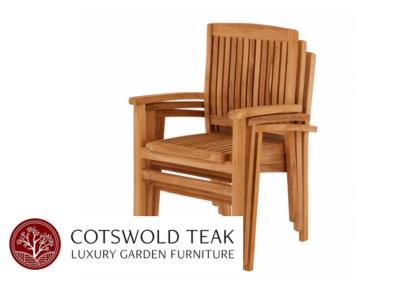How Do I Feng Shui My Garden?
Have you always struggled to create a relaxed atmosphere in your outdoor space? Or, maybe you’re interested in learning more about building a harmonious living environment?
Whatever your reasons may be for reading this article, we’re here to give advice on how you can successfully create a more balanced and peaceful outdoor area - with the help of feng shui.
Read on to discover how to feng shui your garden…
Feng Shui overview
To have a good understanding of how to feng shui your garden, you must first be well acquainted with what feng shui means. See below for the most commonly asked questions surrounding this concept below.
What is Feng Shui?
A common misconception about feng shui is that it’s complicated. Well, we’re here to assure you that it isn’t!
Feng shui believes that we can influence our feelings and sense of peace through our surroundings if we allow space for natural energies to flow through. In other words, it’s simply about consciously removing any negative energies from our environment, wherever possible.
How long has the concept of feng shui been around?
Feng shui certainly isn’t a new theory. In fact, it’s been around since the 9th century, documenting back as early as 960 B.C.
Where does feng shui originate from?
Feng shui originates from Chinese culture, however, the practice has become increasingly popular within westernised cultures.
Interestingly, because China has been practising feng shui for thousands of years - you’ll be able to notice that towns and cities are actually designed to align with feng shui concepts.
This includes the arrangement of buildings in cities and public gardens that are specially designed to align with the core principles of feng shui, to achieve a harmonious sense of community and balance between people and nature.
How does feng shui relate to garden spaces?
The concept believes that you can harness energies if you layout your garden to align with feng shui. And, in theory, this should bring you a sense of peace, contentment, balance and good fortune.
Gardens tend to be a very popular space to practice feng shui - simply because it’s a place where we can work with the elements to form a better balance of natural surroundings.
The 5 core principles of Feng Shui
Before you’re able to create a feng shui garden, you’ll need to be aware of the 5 core principles of feng shui.
The 5 core principles of feng shui are focused on the elements. This includes incorporating the following into your outdoor space - fire, water, wood, earth and metal. See below for more information on how to use these principles to create a feng shui garden.
Wood
Wood in the context of feng shui signifies growth, spirituality, trust, vitality and kindness.
Adding timber features is essential for creating an authentic feng shui garden! Our advice would be to invest inquality timber furnishings and plant trees around your outdoor space, wherever possible.
Burford Teak Coffee Table with Crummock Chairs - shop now.
If you’re working with limited outdoor space, fear not. There are plenty of evergreen trees that you could plant that would be perfectly suited to a smaller space. For information on this, click here to read the Royal Horticultural Society’s article on smaller evergreen tree recommendations for UK gardens.
Churn 8 Seater Teak Table 160cm with Malvern Side Chairs - shop now.
Fire
Fire in feng shui is related to passion, expression and inspiration.
When it comes to the fire principle, there are many different ways you can successfully add touches of this element to create a more feng shui-friendly garden space.
Erizo 50 Garden Fire Pit - shop now.
Adding a fire feature is a great way to add a touch of this feng shui principle to your outdoor space. Not only that, but you could also add floral displays that showcase fiery accents, such as oranges, deep purples and red tones.
For example, in the UK, forest pansies are a lovely all-year-round plant that can display a variation of red shades, which turn into a darker yellow shade during autumn. Alternatively, orange coneflowers are an absolute delight to have featured in an outdoor space.
Hex Garden Fire Pit - shop now.
Earth
The earth element in feng shui signifies health, knowledge, stability and nourishment.
The easiest way to add earth elements to your outdoor space is to add flower beds and rock features. For example, think beautifully crafted ceramic pots, wooden planters, decorative stones, and boulder displays.
Solid Teak Planter - shop now.
When it comes to the colours associated with the earth element of feng shui - add touches of yellows, earthy browns and greens.
For example, a lovely green parasol to match your garden furniture would make for a beautiful earth tribute. Or, if you’re fully committed to creating a feng shui garden - ensure that all of your soft furnishings (e.g. seat cushions) feature at least one of these colours.
Black Decorative Stones - shop now.
Water
Next, we have the water principle of feng shui. This is an extremely important element when it comes to creating a feng shui garden, as it signifies prosperity, luck and abundance.
Our advice for this element would be to consider adding water features to your outdoor space. How you decide to incorporate this element will ultimately depend on the availability of space and the overall layout of your garden.
Think ponds, fountain features, or to keep it simple - add a beautiful birdbath!
Metal
Lastly, we have the metal element of feng shui. This element represents integrity, joy, clarity and precision.
The most common way people choose to include this element in their outdoor spaces is by adding touches of either silver, copper or shades of white.
For example, our premium outdoor heating selection would be ideal for adding a touch of this element to your outdoor space, as many of our available models feature white and silver tones.
Another popular way of incorporating the metal elements into feng shui-friendly gardens is through wind chimes. This is because wind chimes tend to be made from metal and signify good luck.
Alternatively, you could plant flowers that slot in seamlessly with the metal element of feng shui. For example, potentilla flowers feature a lovely white tone, which matches this element perfectly.
Umbrella Gas Patio Heater - shop now.
Feng shui home and garden best practices
Here are several additional tips to consider when creating a feng shui garden space.
- Remove all clutter from your garden to instantly create a more relaxed environment.
- If you’re struggling with the layout of your garden, there are detailed feng shui garden maps to help guide you that are available online.
- Keep all of your walkways and pathways clear.
- Try to avoid colours that clash. Go for colours that sync together in harmony.
- Remove any dying plants from your outdoor area.
- Try to include natural boundaries wherever possible.
Feng shui-friendly garden furniture at Cotswold Teak
We hope you’ve enjoyed reading our article on how to feng shui your garden.
At Cotswold Teak, we offer an extensive selection of beautiful garden furniture and accessories that are ideal for feng shui gardens - so be sure to browse the rest of our website for more!
If you have any questions or want to know more about any of our collections, please don’t hesitate to contact a member of our friendly team who will be happy to help with any queries you may have. Call us on 01608 544 825 or email [email protected].
Shop feng shui-friendly garden furniture at Cotswold Teak today
For more garden furniture information and buying advice, read the Cotswold Teak blog…
How to Make the Most Out of National Gardening Week 2022 | What is the Most Environmentally Friendly Garden Furniture?| How Do You Get Rid of Old Garden Furniture?




